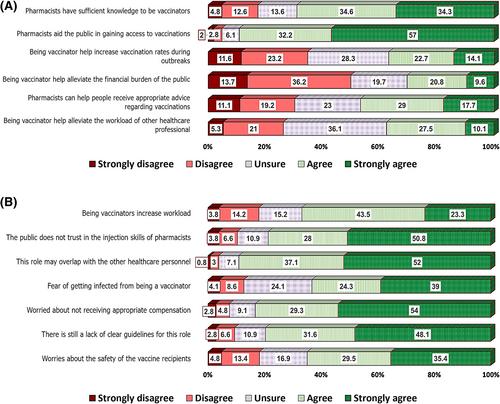An analysis of attitudes, knowledge, and willingness of Thai pharmacists as vaccinators: A nationwide survey study
Abstract
Introduction
Despite the diverse roles of pharmacists in immunization, the vaccinator role remains uncharted for Thai pharmacists. This survey assesses pharmacist attitudes, knowledge, and willingness as vaccinators, providing insights to enhance their pivotal contribution to vaccination outcomes in Thailand.
Methods
The survey encompassed three sections: respondent characteristics, attitudes toward the vaccinator role, and vaccination knowledge. Disseminated via the Pharmacy Council of Thailand (PCT)'s email system, it received 400 valid responses. Descriptive and inferential statistics were employed, including logistic regression to identify factors affecting willingness to become vaccinators (p < 0.05).
Results
The survey was conducted between January 19, 2023, and February 28, 2023. The respondents, with an average age of 39.8 ± 10.25 years, were predominantly female (54.5%) with bachelor's degrees (68%). Hospital (45%) and community (20.7%) pharmacists were prominent, primarily in the central region (51%). Notably, 12.3% received vaccination training from PCT. Of the respondents, 169 (42.25%) were willing to become vaccinators, while 231 (57.75%) were uncertain or uninterested. Factors driving willingness differed; knowledge and skills for vaccine administration (72.59%) were crucial for those not willing to become vaccinators, while public benefits (73.91%) influenced vaccinators. In multivariate analysis, longer experience (10–19 years) (odds ratio [OR] 2.317; p = 0.009) and vaccination training (OR = 1.926; p = 0.047) were significant factors supporting the decision to become vaccinators. Average vaccination knowledge scores were 5.68 ± 2.63 out of 12 points, slightly higher in the vaccinator group (6 ± 2.3) compared to non-vaccinators (5.4 ± 2.8) with a significant difference (p = 0.034). Post-vaccination counseling knowledge was high, but questions related to adverse events following immunization (AEFI) had low correct response rates (12.5%).
Conclusion
The study underscores substantial willingness among Thai pharmacists to assume the vaccinator role, revealing influential factors and knowledge gaps. This insight can guide training enhancements and implementation strategies to seamlessly expand pharmacist contributions to vaccination efforts.

| 公司名称 | 产品信息 | 采购帮参考价格 |
|---|

 求助内容:
求助内容: 应助结果提醒方式:
应助结果提醒方式:


